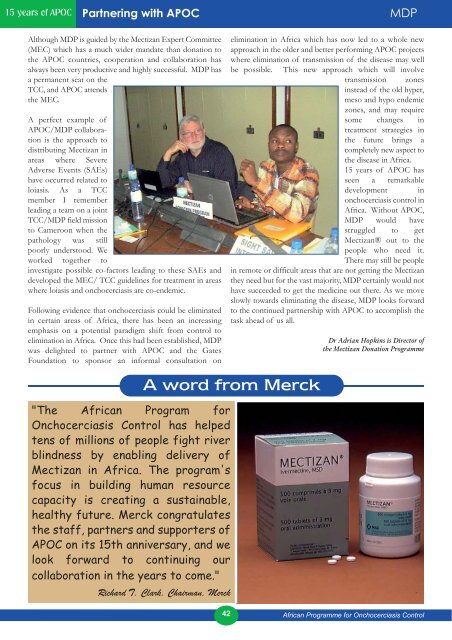15 years of APOC - World Health Organization
15 years of APOC - World Health Organization
15 years of APOC - World Health Organization
You also want an ePaper? Increase the reach of your titles
YUMPU automatically turns print PDFs into web optimized ePapers that Google loves.
<strong>15</strong> <strong>years</strong> <strong>of</strong> <strong>APOC</strong><br />
Partnering with <strong>APOC</strong> MDP<br />
Although MDP is guided by the Mectizan Expert Committee<br />
(MEC) which has a much wider mandate than donation to<br />
the <strong>APOC</strong> countries, cooperation and collaboration has<br />
always been very productive and highly successful. MDP has<br />
a permanent seat on the<br />
TCC, and <strong>APOC</strong> attends<br />
the MEC.<br />
A perfect example <strong>of</strong><br />
<strong>APOC</strong>/MDP collaboration<br />
is the approach to<br />
distributing Mectizan in<br />
areas where Severe<br />
Adverse Events (SAEs)<br />
have occurred related to<br />
loiasis. As a TCC<br />
member I remember<br />
leading a team on a joint<br />
TCC/MDP field mission<br />
to Cameroon when the<br />
pathology was still<br />
poorly understood. We<br />
worked together to<br />
investigate possible co-factors leading to these SAEs and<br />
developed the MEC/ TCC guidelines for treatment in areas<br />
where loiasis and onchocerciasis are co-endemic.<br />
Following evidence that onchocerciasis could be eliminated<br />
in certain areas <strong>of</strong> Africa, there has been an increasing<br />
emphasis on a potential paradigm shift from control to<br />
elimination in Africa. Once this had been established, MDP<br />
was delighted to partner with <strong>APOC</strong> and the Gates<br />
Foundation to sponsor an informal consultation on<br />
42<br />
elimination in Africa which has now led to a whole new<br />
approach in the older and better performing <strong>APOC</strong> projects<br />
where elimination <strong>of</strong> transmission <strong>of</strong> the disease may well<br />
be possible. This new approach which will involve<br />
transmission zones<br />
instead <strong>of</strong> the old hyper,<br />
meso and hypo endemic<br />
zones, and may require<br />
some changes in<br />
treatment strategies in<br />
the future brings a<br />
completely new aspect to<br />
the disease in Africa.<br />
<strong>15</strong> <strong>years</strong> <strong>of</strong> <strong>APOC</strong> has<br />
seen a remarkable<br />
development in<br />
onchocerciasis control in<br />
Africa. Without <strong>APOC</strong>,<br />
MDP would have<br />
struggled to get<br />
Mectizan® out to the<br />
people who need it.<br />
There may still be people<br />
in remote or difficult areas that are not getting the Mectizan<br />
they need but for the vast majority, MDP certainly would not<br />
have succeeded to get the medicine out there. As we move<br />
slowly towards eliminating the disease, MDP looks forward<br />
to the continued partnership with <strong>APOC</strong> to accomplish the<br />
task ahead <strong>of</strong> us all.<br />
A word from Merck<br />
"The African Program for<br />
Onchocerciasis Control has helped<br />
tens <strong>of</strong> millions <strong>of</strong> people fight river<br />
blindness by enabling delivery <strong>of</strong><br />
Mectizan in Africa. The program's<br />
focus in building human resource<br />
capacity is creating a sustainable,<br />
healthy future. Merck congratulates<br />
the staff, partners and supporters <strong>of</strong><br />
<strong>APOC</strong> on its <strong>15</strong>th anniversary, and we<br />
look forward to continuing our<br />
collaboration in the <strong>years</strong> to come."<br />
Richard T. Clark, Chairman, Merck<br />
Dr Adrian Hopkins is Director <strong>of</strong><br />
the Mectizan Donation Programme<br />
African Programme for Onchocerciasis Control

















